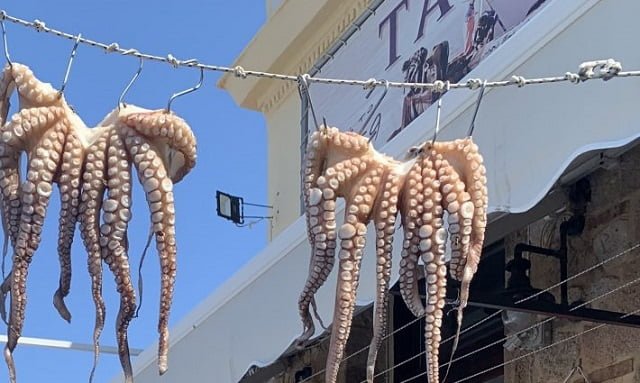
by BES Press Office
A new study from the University of Santiago de Compostela utilises the IPBES (Intergovernmental Science-Policy Platform of Biodiversity and Ecosystem Services) to identify how international policy can increase the sustainability of the global cephalopod food system.
Food systems can have a detrimental impact on biodiversity loss, therefore reversing biodiversity loss depends on us transforming the methods of food production to achieve more sustainable food systems. Most current research has focused on food systems within the agricultural sector, however a new paper by the University of Santiago de Compostela, published in People and Nature, highlights the criticality of the seafood sector.
Cephalopods such as cuttlefish, octopus and squids provide health benefits to nature and people. They act as vital predators within marine ecosystems, while also being a nutritionally important seafood source that can support human food security. However, the link between ecosystems that cephalopods inhabit, food system policies, and human wellbeing, have previously never been studied.
Across the world, cephalopod fisheries have rapidly expanded over the past 50 years, and have moved into new fishing areas to match the growing market demand. However, the availability and abundance of cephalopods fluctuates due to natural reasons, as well as environmental effects like climate change.
Market preferences for particular cephalopods also impacts on food systems in a way that is poorly understood. This further increases the uncertainty around the sustainability of cephalopod fisheries. The new study addresses the need to better understand the cephalopod food system by exploring the connections between nature’s contributions to people (ecosystem services), food system policies and human wellbeing.
The team conducted a global literature review, analysing scientific studies related to market drivers that influence three market sectors of the cephalopod food system: catch, trade and consumption. Key findings revealed nine dynamic traits and 29 ‘cephalopod market drivers’ within the cephalopod food system. These link the ecosystems that cephalopods inhabit, to the catch, trade and consumption of cephalopod products.
The researchers also identified important value chain actors; supply chain components; cultural, provisioning and supporting services provided by cephalopods (like material and non-material indicators of human wellbeing) and key policies and market interventions affecting cephalopod food system dynamics.
The IPBES (Intergovernmental Science-Policy Platform on Biodiversity and Ecosystem Services) framework is a socio-ecological model of the complex interactions between human society and the natural world. It contains six interlinked elements: nature’s contributions to people, anthropogenic assets, institutions, governance (and other indirect drivers of change), direct drivers of change and good quality of life.
The authors were able to link each of the nine food system traits identified in the study to a corresponding interlinked element of the IPBES. With the aim of driving the necessary change towards sustainable food systems in the future, the team were able to understand the links between market demand, policies and processes in regards to cephalopods and the associated impacts on their populations and ecosystems.
As a result, the authors created a novel market-based version is the IPBES called the ‘Cephalopod Food System Framework’. It provides a simplified overview of the dynamics in cephalopod food systems by depicting the relationships between cephalopod ecosystem services, fisheries (and other institutions), anthropogenic assets, nature’s contribution to people and good quality of life.
All of these factors are linked to the political realms of commerce and sustainable food systems through a proposed policy landscape. The authors recommend that the policy landscape should integrate nationals and regional pathways towards the creation of resilient, equitable, sustainable and inclusive food systems. They also highlight the need to respect cultural traditions from the most vulnerable and local coastal communities.
The study provides an important contribution for the global diagnosis of opportunities and constraints regarding the role of cephalopods in transformations towards a more diversified and resilient seafood production system.
This landscape is highly complex in terms of interactions between sectors involved, requiring integration and collaboration at various geographical, societal and temporal points. Therefore the paper highlights four key factors (relating to cephalopods) that can support the transitions towards food security: the value of new aquatic food species, food safety and authenticity systems, place-based innovations and finally, empowerment of communities and consumer behaviour – motivations for better health and environmental sustainability.
The authors conclude that it is vital that food systems policies should match ambitions relating to biodiversity conservation such as the Convention of Biological Diversity. Applying the IPBES framework and its features in a novel setting can lead the way for potential adaptations to understand more socio-ecological systems.
Reference (open access):
Ainsworth, G. B., Pita, P., Garcia Rodrigues, J., Pita, C., Roumbedakis, K., Fonseca, T., Castelo, D., Longo, C., Power, A. M., Pierce, G. J., & Villasante, S. (2023). Disentangling global market drivers for cephalopods to foster transformations towards sustainable seafood systems. People and Nature, 00, 1– 21. https://doi.org/10.1002/pan3.10442

